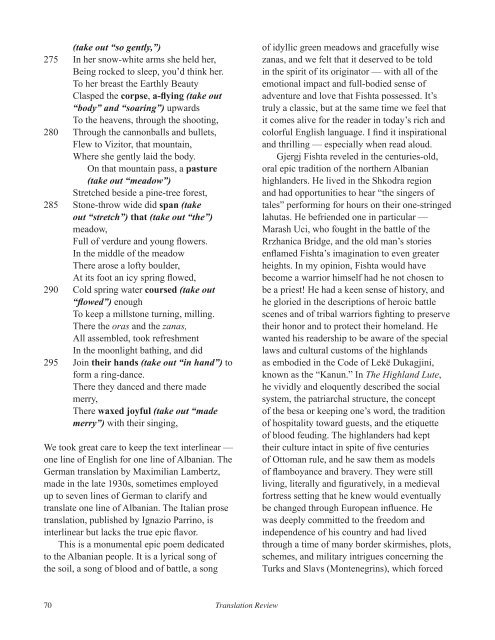Table of contents - The University of Texas at Dallas
Table of contents - The University of Texas at Dallas
Table of contents - The University of Texas at Dallas
You also want an ePaper? Increase the reach of your titles
YUMPU automatically turns print PDFs into web optimized ePapers that Google loves.
(take out “so gently,”)<br />
275 In her snow-white arms she held her,<br />
Being rocked to sleep, you’d think her.<br />
To her breast the Earthly Beauty<br />
Clasped the corpse, a-flying (take out<br />
“body” and “soaring”) upwards<br />
To the heavens, through the shooting,<br />
280 Through the cannonballs and bullets,<br />
Flew to Vizitor, th<strong>at</strong> mountain,<br />
Where she gently laid the body.<br />
On th<strong>at</strong> mountain pass, a pasture<br />
(take out “meadow”)<br />
Stretched beside a pine-tree forest,<br />
285 Stone-throw wide did span (take<br />
out “stretch”) th<strong>at</strong> (take out “the”)<br />
meadow,<br />
Full <strong>of</strong> verdure and young flowers.<br />
In the middle <strong>of</strong> the meadow<br />
<strong>The</strong>re arose a l<strong>of</strong>ty boulder,<br />
At its foot an icy spring flowed,<br />
290 Cold spring w<strong>at</strong>er coursed (take out<br />
“flowed”) enough<br />
To keep a millstone turning, milling.<br />
<strong>The</strong>re the oras and the zanas,<br />
All assembled, took refreshment<br />
In the moonlight b<strong>at</strong>hing, and did<br />
295 Join their hands (take out “in hand”) to<br />
form a ring-dance.<br />
<strong>The</strong>re they danced and there made<br />
merry,<br />
<strong>The</strong>re waxed joyful (take out “made<br />
merry”) with their singing,<br />
We took gre<strong>at</strong> care to keep the text interlinear —<br />
one line <strong>of</strong> English for one line <strong>of</strong> Albanian. <strong>The</strong><br />
German transl<strong>at</strong>ion by Maximilian Lambertz,<br />
made in the l<strong>at</strong>e 1930s, sometimes employed<br />
up to seven lines <strong>of</strong> German to clarify and<br />
transl<strong>at</strong>e one line <strong>of</strong> Albanian. <strong>The</strong> Italian prose<br />
transl<strong>at</strong>ion, published by Ignazio Parrino, is<br />
interlinear but lacks the true epic flavor.<br />
This is a monumental epic poem dedic<strong>at</strong>ed<br />
to the Albanian people. It is a lyrical song <strong>of</strong><br />
the soil, a song <strong>of</strong> blood and <strong>of</strong> b<strong>at</strong>tle, a song<br />
<strong>of</strong> idyllic green meadows and gracefully wise<br />
zanas, and we felt th<strong>at</strong> it deserved to be told<br />
in the spirit <strong>of</strong> its origin<strong>at</strong>or — with all <strong>of</strong> the<br />
emotional impact and full-bodied sense <strong>of</strong><br />
adventure and love th<strong>at</strong> Fishta possessed. It’s<br />
truly a classic, but <strong>at</strong> the same time we feel th<strong>at</strong><br />
it comes alive for the reader in today’s rich and<br />
colorful English language. I find it inspir<strong>at</strong>ional<br />
and thrilling — especially when read aloud.<br />
Gjergj Fishta reveled in the centuries-old,<br />
oral epic tradition <strong>of</strong> the northern Albanian<br />
highlanders. He lived in the Shkodra region<br />
and had opportunities to hear “the singers <strong>of</strong><br />
tales” performing for hours on their one-stringed<br />
lahutas. He befriended one in particular —<br />
Marash Uci, who fought in the b<strong>at</strong>tle <strong>of</strong> the<br />
Rrzhanica Bridge, and the old man’s stories<br />
enflamed Fishta’s imagin<strong>at</strong>ion to even gre<strong>at</strong>er<br />
heights. In my opinion, Fishta would have<br />
become a warrior himself had he not chosen to<br />
be a priest! He had a keen sense <strong>of</strong> history, and<br />
he gloried in the descriptions <strong>of</strong> heroic b<strong>at</strong>tle<br />
scenes and <strong>of</strong> tribal warriors fighting to preserve<br />
their honor and to protect their homeland. He<br />
wanted his readership to be aware <strong>of</strong> the special<br />
laws and cultural customs <strong>of</strong> the highlands<br />
as embodied in the Code <strong>of</strong> Lekë Dukagjini,<br />
known as the “Kanun.” In <strong>The</strong> Highland Lute,<br />
he vividly and eloquently described the social<br />
system, the p<strong>at</strong>riarchal structure, the concept<br />
<strong>of</strong> the besa or keeping one’s word, the tradition<br />
<strong>of</strong> hospitality toward guests, and the etiquette<br />
<strong>of</strong> blood feuding. <strong>The</strong> highlanders had kept<br />
their culture intact in spite <strong>of</strong> five centuries<br />
<strong>of</strong> Ottoman rule, and he saw them as models<br />
<strong>of</strong> flamboyance and bravery. <strong>The</strong>y were still<br />
living, literally and figur<strong>at</strong>ively, in a medieval<br />
fortress setting th<strong>at</strong> he knew would eventually<br />
be changed through European influence. He<br />
was deeply committed to the freedom and<br />
independence <strong>of</strong> his country and had lived<br />
through a time <strong>of</strong> many border skirmishes, plots,<br />
schemes, and military intrigues concerning the<br />
Turks and Slavs (Montenegrins), which forced<br />
70 Transl<strong>at</strong>ion Review

















